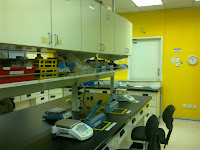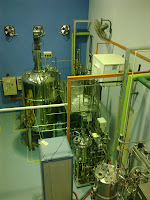I am a person who enjoys adventurous life. I enjoy outdoor activities, enjoy chilling out with friends, enjoy facing challenges and solving problems. Life is too short for perhaps and maybes. Let's live life to the max!
Monday, February 7, 2011
Organizational Capabilities and Competitive Analysis
Monday, January 31, 2011
Research Field Trip in Kuching, Sarawak




Friday, January 14, 2011
Clinical Data Management and Biostatisticians
In clinical research, a tool called clinical data management system (CDMS) is used to handle the data of a clinical trial. The data will be gathered from the investigator in case report form, which are then stored in the CDMS. Proper storage and good management of these data are vital in the pharmaceutical industry in order to provide high quality and reliability of the data results. The reason why quality is of essence in this industry is because poor quality will mean a postponement in the development of drug and introduction to the market, which will eventually bring about huge loss to the pharmaceutical companies.
For these reasons, the fifth session introduced us to clinical data management. Although I could not attend the session because I need to attend research field trip briefing at university, I took the initiative to study this topic by myself and obtained information online.
I learned that to produce quality clinical data management and to ensure process improvements, ongoing quality checks which draw attention to the probability of error estimation and error minimization should be carried out. Full commitment should be made by institutions and organizations when handling clinical data to ensure data are stored appropriately and suitably for later use. Nevertheless, this is not always the case as it could be relatively costly to do systematic curation as it not only involves carrying out good and reproducible science, but also about integrating the data from various sources and applying them in novel ways.
When reaches the end of the clinical trial, data collected in the CDMS has to be sent to the statisticians to analyze the data before sending to the regulatory authorities for approval. This is when biostatisticians come into the picture of clinical research. Biostatisticians play a significant role in phase I trial to permit clinical researchers to produce accurate inferences from acquired data and to deduce sound decisions when uncertainty is present. Statistical planning as well as analysis which are done with high accuracy will ensure that the reporting and documentations are delivered with high-quality. Because of the importance of biostatisticians in clinical research, guidelines by the Royal Statistical Society have been set up.
In a nutshell, the field of clinical research require cooperation from many parties and organizations to ensure a high-quality finishing result. I really glad I am part of this BeST programme which covers not only biotechnology field but clinical research field to provide insight in this rapidly expanding field, which will generate plenty of exciting opportunities for the trained professionals.
Wednesday, January 12, 2011
Clinical Research - A Potential Market in Malaysia
Malaysia is one of the countries in Asia which has everything to offer when it comes to pharmaceutical research and development, be it the clinical trials or the facilities. Yet, Malaysia seems to be bypassed by foreign investors due to the lack of publicity as well as some problems that happen in Malaysia, such as delayed timelines, bureaucracy, and long approval processes.
In order to succeed in this industry, BeST programme has incorporated clinical research into the technical module. The first two sessions were on IP and ethics. Moving on to the third day, the session got much more challenging and informative.
We studied the role of sponsors for clinical trials. The sponsors have to select for capable candidates as investigators. Application for licenses, quality control and quality assurance are also sponsor’s responsibilities to ensure that clinical protocols and designs are carried out with accordance to the standard procedures and to ensure that the produced results are reliable.
Next, we also were taught on good clinical practice (GCP). This is a crucial part under clinical trials because trials involve human patients. GCP plays a very crucial role in protecting the human subjects from being exploited. This is when informed consent comes into the picture, where each human participant has the right to decide whether or not to participate. Since informed consent is not a contract, participants have the right to withdraw from the trial at any time.
The session ended with the importance of safety reporting, which more specifically known as adverse event reporting. This reporting system is very important because it takes into account the ethical and legal responsibilities in obtaining and analyzing safety details. Furthermore, it permits effective communication of correct information to regulators, physicians as well as the consumers.
From the session, it was understood that healthcare and clinical research have great potential in Malaysia. It is enlightening that the government has taken extra measures to strengthen the human resource force by incorporating this session into BeST programme. It is time for the government to take prompt action to build up experience healthcare professionals. If no concrete steps are taken, we will lose out. It is time for us to sit tight, be bold and move forward.
Tuesday, January 11, 2011
Clinical Research and Ethics
Monday, January 10, 2011
Intellectual Property - Patents, Copyrights, Trademarks
Intellectual property (IP) is the creations of one’s mind. It includes copyrights, patents, trademarks, industrial design rights and trade secrets. IP protection has been of critical importance in today’s modern world to encourage innovation. This is because IP protection allows ideas to be protected so that businesses would reap maximum benefits of their inventions and would encourage more research and development. Due to the importance of IP, BeST programme has arranged an experienced and reputable speaker Assoc. Prof. Rohazar Wati Zuallcobley from the Faculty of Law, MARA University of Technology, for us students.
She started her lecture by telling us the importance of strong IP for innovation in boosting the national economic growth, and that under the law of IP, exclusive rights of owners to intangible assets such as knowledge and creativity can be granted. We understood the differences between different types of IP, how IP plays a role as economic tools for conversion of innovation into assets, how patents are applied and granted and the several routes to grant a patent.
The second half of her lecture was on trademark as a branding strategy. The lecture became much more interesting when she taught us the ways to differentiate registrable and non-registrable trademarks, as well as the history and function of trademarks. Finally she concluded the lecture with confidential information and trade secret, which allowed us to understand the rationale and history behind them.
Before she ended her lecture, she reminded us on one thing that happens to today’s high-technology world: the digital revolution has made IP become more susceptible to mass copying and zero-cost distribution of digital materials. This will pose a threat to IP and hence each of us should help to fight against piracy and counterfeiting to help the inventors from suffering losses and getting full protection from IP system. May all Malaysians as well as people from other countries will cherish the hard work and creation of great minds.
Friday, January 7, 2011
Secret to Launch a Good Business Idea
The lecture continued with more interactive sessions with the most interesting session being the ‘Elevator Pitch’. An ‘Elevator Pitch’ means a 30 to 60 seconds well-practiced and succinct description of our company that your mother or even your grandmother can understand during the time it would needed to ride up an elevator. It is something like the lyrics of Eminem’s ‘Lose Yourself’:
Look, if you had one shot…
One opportunity to seize everything you ever wanted…
One moment…
Would you capture it…
Or just let it slip away?
Why should an entrepreneur need to put great emphasis on ‘Elevator Pitch’? This is simply because it can help to figure out what is at the core of a person’s business. Dr. Roland continued with the three main components of Elevator Pitch: Hook à NABC à Close. Each group has to present its product with the aim to kill during Elevator Pitch. Some groups did really very good job and were praised by the speaker and the crowds.
Yesterday and today’s lectures were really very valuable as we learned to think and act like an entrepreneur. The lectures also encouraged us to allow our business idea juices to flow. Thank you Dr. Roland, for making the lectures interesting and inspiring. Kudos to you!
Thursday, January 6, 2011
Are You Innovative Enough To Be An Entrepreneur?
‘Do you know that in Malaysia, there are many unemployed youth, and that the number has been increasing substantially?’ This was the question raised by our speaker of the day, Dr Roland Xavier. He continued: ‘Being a science graduates, you too can be entrepreneurs.’
Dr Roland started his lecture by telling us the importance of innovation in order to be a successful entrepreneur. He told us that many people always confused the terms creativity and innovation. Creativity means coming up with new ideas, whilst innovation means bringing ideas to life. As science involves the conversion of money into knowledge, innovation involves the conversion of knowledge into money. Hence in order to market a product, it is not about coming out with a new idea or coming out with a new scientific theory, but how we convert all these ideas and theories into marketable products or services that can generate wealth. His lecture did not fail to amaze the class as he told us the difference between important and interesting in selling a product or service. He explained that only important products that keep customers’ needs addressed can help to keep a business survive. This is because it can generate higher profit as customers are willing to pay a premium for solutions. On the other hand, interesting products usually are unnecessary products in daily life because there are not “solving the customers’ pain”, and hence the chances of a company selling interesting products, such as magazine company, will be less likely to survive in the twenty-first century.
After attending his lecture, I learned to think like an entrepreneur, and understand that it is innovation-led businesses which will eventually lead to business success. I am looking forward to attending tomorrow’s class to gain more valuable knowledge from the second part of his lecture.
Industrial Visit to Stellagen Sdn. Bhd.



In a nutshell, this industrial visit provided an insight on how a biotechnology company works and helpful information related to practical facets which cannot be envisaged in lectures. Be Bold. Be Daring. Shoot for the Moon. This will be the motto for one to be successful in setting up a company.
Monday, January 3, 2011
Innovation - The Key to Business Success


Sunday, January 2, 2011
2011: Dawn of the New Decade
Here comes an end of year 2010, and the starting of year 2011. Time flies so fast, and the last decade has just marked a full-stop. Entering the new decade, I ponder: What have I achieved throughout the past ten years? What have I learned? What is my passion in life?
Looking back envisioning all that I have done within the past ten years, back when I was in secondary school, to college, and to university, my life has been full of colours. These years have been moulding me from a happy-go-lucky girl-next-door to a confident and independent young lady.
Back to ten years ago, I was still a child of 13 years old full of ignorance and innocence. My secondary life has been a huge transition in my life. Being a student leader, I acquired social and leadership skills; being a debater, it has taught me conceptual skills and the self- confidence; learning Yamaha Electone, I began to understand the beauty of different melodies and the magical wonders of using both left and right brains.
When I stepped into college to pursue A-levels, life has been even more exciting. Juggling between studies and extra-curricular activities has been challenging yet rewarding. Not only that I had to achieve good grades to maintain my scholarship, I was the President of Chinese Cultural Society. From there I learned to do things in a systematic manner, handling things in an impromptu manner and deliver promises within time constraint. All these soft skills can only be learned by experience and mistakes. What does not kill me can only make me stronger. Not only that, I got the chance to take part in several cultural dances and even Latin dance! It has been an unforgettable chapter of my life.
Moving on the undergraduate studies, I found my passion in life – to embark on education or career that will eventually lead me to helping others, especially the underprivileged populations, in terms of their basic needs such as food and water. I realized how fortunate I am to live in a country with rich natural resources, abundant rainfall and fertile lands. An agricultural biotechnology student, I hope that I can improve the nutrition values and productivity of crops. This has been my dream and right now, the flame of passion ignited in my heart continues to burn even brighter. I have a dream and I have the courage to be who I really want to be.
Being just a fresh Monash graduate last December, I looked forward to exploring the world full of excitement, and voila, I was selected for the BeST program. Being the only Chinese race in the program, it taught me that no matter what colour of our skin, or what language we speak, we share the common aim – the love for our country Malaysia. We study together, play together, work together, joke together, these are such precious moments which I have never experience before.
Now, I still left with two months of soft-skill training and three months of internship under BeST program. I am anticipating with the subsequent courses and training. I foresee myself as someone who will be very successful, not in terms of monetary value, but self-satisfaction, because I will equip with valuable knowledge of communication, technical and entrepreneurship throughout this program, which will help me to be a highly qualified person in the world of agriculture and biotechnology.



